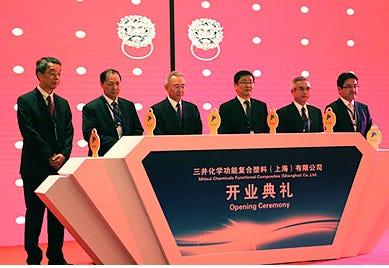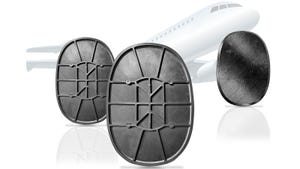Mitsui inaugurates elastomers plant in China
Mitsui Chemicals, Inc. (Tokyo) officially launched its new manufacturing and sales company for elastomeric olefin and adhesive compounds in China, Mitsui Chemicals Functional Composites (Shanghai) (MFS), with an opening ceremony on October 27th. Capacity at the plant is 11,000 tonnes/year.
October 30, 2015
Mitsui Chemicals, Inc. (Tokyo) officially launched its new manufacturing and sales company for elastomeric olefin and adhesive compounds in China, Mitsui Chemicals Functional Composites (Shanghai) (MFS), with an opening ceremony on October 27th. Capacity at the plant is 11,000 tonnes/year.
|
Company and local officials inaugurate new elastomer and adhesive resins plant in Shanghai. |
MFS is strategically situated in Eastern China and targets the capture of China's rapidly growing automotive and packaging material markets. This March the company commenced manufacture and sales of Milastomer, a thermoplastic elastomer used in automotive window seals and as interior material, and Admer, an adhesive polyolefin used in automotive fuel tanks and food packaging materials.
Milastomer is thermoplastic vulcanizate (TPV) composed of EPDM compounded in a polypropylene (PP) matrix. It is highly flexible, resembling vulcanized rubber, and adapts well to various molding methods. With low density, Milastomer is light-weight with wide applications in the automotive industry and great expectations for its potential to improve fuel consumption. Further, as the material is easily recyclable, economic benefits from reuse of scrap material are reportedly high. Applications include automotive glass run channels, automobile interior materials, mudguards, sealing, and grips.
Admer is an adhesive resin developed by Mitsui Chemicals using proprietary technology. A modified polyolefin with functional groups, Admer is designed to bond to a variety of polyolefins, ionomers, polyamides, gas barrier resin's such as ethylene vinyl alcohol (EVOH), ceramics, glass, and metals. Its strong adherence and use with a wide variety of co-extrusion processes allows uses in bottle, tube, sheet, and film applications in various industries including food packaging. Increasing awareness of food safety and hygiene in China and demand for multi-layer food packaging materials is expected to drive demand for the material.
You May Also Like



